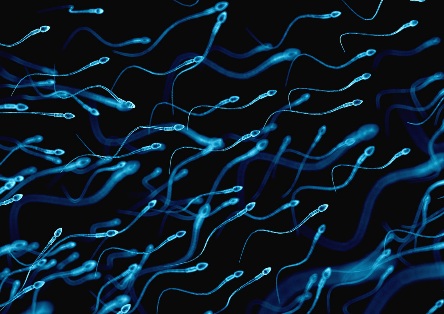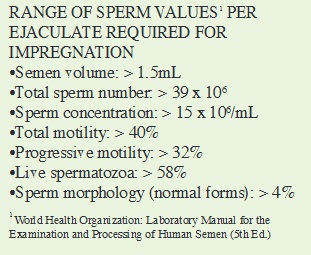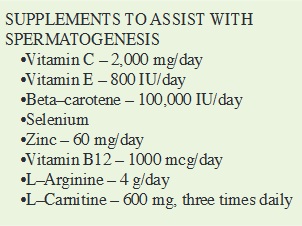Men's Health: Male Factor Infertility
 The incidence of male factor infertility is believed to be increasing in the Western world. It is associated with problems of sperm quality and/or delivery with numerous factors implicated, including low sperm concentration, non-liquefaction of semen, high proportion of abnormal sperm, sperm motility problems and structural impediments in the reproductive pathway.
The incidence of male factor infertility is believed to be increasing in the Western world. It is associated with problems of sperm quality and/or delivery with numerous factors implicated, including low sperm concentration, non-liquefaction of semen, high proportion of abnormal sperm, sperm motility problems and structural impediments in the reproductive pathway.
In Chinese, the word for sperm and essence is the same (jīng 精 ), that is, they have the same origin and are inextricably linked. According to Chinese medicine, the quality of sperm and its ability to fertilize an ovum is intimately linked to the health of the Kidneys and requires a number of factors to converge. Firstly, sperm must be formed in sufficient numbers, a function of Kidney essence. They must be healthy, motile and energetic. This requires intact Kidney yang, while the seminal fluid that maintains them on their journey towards the egg must be nutritious and of the right consistency, a function of Kidney yin.
Secondly the hardware must be functional. The passageways from the testes to the urethral meatus must be clear and unimpeded by phlegm, damp heat or blood stasis, and the hydraulics of the reproductive system must be intact to enable copulation and ejaculation to occur.
While the widespread intervention of in vitro fertilization (IVF) and intracytoplasmic sperm injection (ICSI) has rendered copulation and ejaculation less relevant for the purposes of reproduction, the crucial factor, from the Chinese medical point of view, remains the quality of the essence that goes into making the baby; this determines the health and vitality of the next generation.

PATHOLOGY
Sperm and the supporting matrix of fluids and nutrients can be damaged by a variety of factors, of which Kidney deficiency and heat are the most important. Acquired or congenital weakness of the Kidneys leads to poor or abnormal production of sperm. Heat, in the form of damp heat, from yin deficiency, fire from qi constraint, an external pathogen with high fever, or environmental sources (sauna, tight pants), has a significant effect on seminal quality and quantity. Being so yang, sperm function best in a slightly cool environment; similarly, seminal fluids are congealed and thickened by heat.
ETIOLOGY
External pathogens
Damp heat can gain access to the lower burner through the local collaterals and channels, or be introduced with the diet. When damp heat gains access to the lower burner directly by transmission via sexual activity, the features are largely contained within the lower burner. When damp heat sinks into the lower burner from the middle burner, symptoms of middle burner disharmony and weight problems are apparent. Damp heat, regardless of the source, is a common cause of sperm disorder and infertility. It damages essence and sperm, leading to poor morphology and congelation of semen and seminal fluid.
Emotional factors
Persistent internalized or repressed emotion and stress constrain the circulation of Liver qi, and as the Liver channel passes through the lower burner, the movement of lower burner qi is obstructed. Persistent qi constraint in turn generates heat or fire, which can damage essence, blood and yin, leading to weakness of the sinews and the ‘ancestral sinew of the Liver’, i.e. the penis, with detrimental effects on erectile function. The combination of heat and essence damage leads to poor sperm quality and production. Obstructed qi fails to lead the blood, resulting in qi and blood stasis, and additional heat accumulation.

Constrained Liver qi can invade and weaken the Spleen, causing qi deficiency and leakage of blood from the vessels, or to the development of damp, which sinks into the lower burner, potentially generating heat and establishing the damp heat cycle.
Diet, medications and drugs
Excessive consumption of rich, greasy, sweet or spicy foods and alcohol results in middle burner disharmony and the generation of damp heat, which can sink and settle in the lower burner. Alternatively, excess cold natured or raw food weakens Spleen qi and yang, leading to dampness, which in turn can stagnate and generate heat and damp heat. Persistent damp heat in the lower burner damages essence and yin, and congeals fluids while prolonged Spleen deficiency drains Kidney yang. A variety of pharmaceutical and recreational substances can also have a deleterious effect on sperm (See box to the left).
Constitutional factors
Congenital weakness of Kidney essence contributes to poor sperm production. When this is the case there will usually be other evidence of Kidney deficiency, such as undescended testicle, delayed development of puberty and secondary sex characteristics, or more overt physical and mental deformity or retardation.

Exhaustion, overwork, age
The volume of available essence declines with age, and although men can father children into their twilight years, the quality of sperm and potential quantity of essence their children inherit becomes progressively meagre. Acquired Kidney deficiency, as a result of working long hours or in gruelling labor, excessive reproductive activity, chronic illness, drug use or lack or restorative sleep has much the same effect, and may intervene at a younger age.
Environmental factors
Those that negatively affect Sperm quality include heat, which is a particular problem and may originate from constrictive underwear, frequent exposure to saunas or hot tubs, long motorcycle or bike riding or the use of lap top computers, and chemical exposure (See box above left).
 TREATMENT DURATION
TREATMENT DURATION
Treatment to improve sperm quality needs to continue for a minimum of three months, or longer in patients with significant Kidney deficiency. Both acupuncture and herbs are effective for assisting sperm production, although herbs are essential in deficiency patterns. Regardless of therapeutic intervention, appropriate changes in diet and lifestyle, and avoidance of factors that damage sperm production are necessary. There are also some specific supplements, in particular antioxidants, which compliment the Chinese medical program and further enhance the outcome. Although a number of patterns are recognized and described, in practice we often see reasonably healthy young men, without obvious or discernible pathology, present with ‘sub fertility’ or ‘unexplained oligospermia’, that is, failure to impregnate with sperm test results at the low end of the normal range.
In such cases, a hypothesis of some degree of Kidney deficiency, in combination with one or more of the additional factors (noted in box to the left) is usually reasonable. Treatment based on this hypothesis should have a positive impact on sperm parameters within three months. If not, blood stasis is often implicated.


Bio: William Maclean, M.Sc Chin. Med. is an internationally renowned practitioner, teacher and author from Australia, with 25 years of clinical experience in the field of Chinese medicine. Will teaches in the Masters programs at the University of Sydney and University of Technology Sydney, and lectures to students and practitioners around the world. In addition to his long years in practice, Will is the author (with Jane Lyttleton) of the Clinical Handbook of Internal Medicine series Volumes 1, 2 and 3, the Clinical Manual of Chinese Herbal Patent Medicines, and the Clinical Handbook of Chinese Herbs: Desk Reference.

